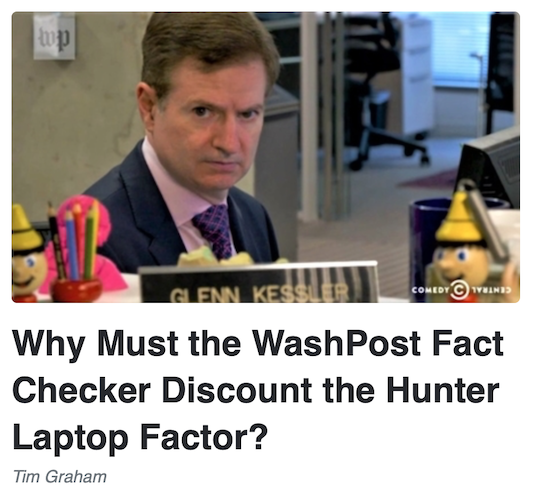Tim Graham served up his own twist on his employer’s Hunter Biden Derangement Syndrome in a May 13 post complaining that a fact-checker brought up an old MRC poll while fact-checking Donald Trump’s CNN town hall:
Washington Post “Fact Checker” Glenn Kessler somehow thinks it’s a terrible idea to do a poll asking about how the 2020 election could have turned out differently. That’s odd, since The Post did polls for several years asking if the Russians made the 2016 election turn out differently. Robert Mueller didn’t find that the Trump campaign colluded with the Russians, but that didn’t stop the incessant journalism promoting that idea.
After the CNN “town hall” with Trump, Kessler took on something Trump said about the Hunter Biden laptop story suppression, and veered into attacking our Media Research Center poll, which Trump didn’t mention. On all the social-media censorship and media bias by omission, Kessler asserted “there’s no evidence it made a difference in the election result.”
Twitter briefly blocked users from sharing the New York Post story on Hunter Biden’s laptop — a decision officials later said was a mistake. We’ve previously examined a poll often cited by Trump allies that suggests telling the tale would have swayed the election. The poll was done by the Polling Company, a conservative pollster founded by Trump adviser Kellyanne Conway, on behalf of the Media Research Center. Our analysis found that the poll conveniently supported a line that Republicans are pushing — that a lack of media coverage related to the Hunter Biden laptop made a difference in the presidential election.
But when you dig into the results, which are swayed by aggressively misleading questions, it shows that for all but a tiny percentage of Biden voters, the story would not have made a difference — even if framed as a still-unproved scandal. The questions in the poll are similar to messages the Trump campaign used in the final weeks before the election — and it still fell short.
As Rich Noyes explained at the time, we asked about some negative Biden themes and positive Trump themes that the media didn’t want to discuss.
Graham strangely didn’t even link to the Kessler fact-check of Trump he’s criticizing here. But he’s really complaining about how, back in February, Kessler called out the poll the MRC bought after the 2020 election in an effort to prove that the election was “stolen” from Trump because the Hunter Biden laptop story wasn’t sufficiently covered when that poll was referenced by Republicans during an GOP-led anti-Biden hearing. Note that Graham stayed silent when Kessler pointed out the wildly biased poll questions (except to huff that they were purportedly questions that “the media didn’t want to discuss,” though that in itself is a biased assessment) and the bias of the pollster. He also didn’t mention that the MRC bought this biased poll even as it was screeching about pre-election media polls purportedly being “deliberately wildly wrong” because they showed Biden winning bigger than he ultimately did. (By contrast, the MRC never lashed out at pollsters in 2022 when their midterm polling showed a “red wave” that never happened.)
Instead, Graham went on to play victim, baselessly suggesting that Kessler was targeting the MRC because it “regularly criticizes The Fact Checker.” He also responded to Kessler pointing out the biased nature of the poll by noting that “some polls are structured to produce the desired result,” by playing whataboutism: “Oh, that never happens at The Washington Post polling shop?” And he got really mad when Kessler argued that Biden’s own campaign messaging trumped the right-wing laptop narrative:
Kessler doesn’t seem to fathom that the liberal media obviously felt that the Hunter Biden laptop story could be a defining story in the election. Doesn’t all the suppression suggest their fear of its impact? But you can only laugh when Kessler claims that blaming media bias is a “stretch.”
But all of the lines that were tested were staples of the Trump campaign’s messaging. MRC suggests that media bias prevented those messages from getting through to voters and changing their minds to vote for Trump or even not vote at all. As we noted, that’s a stretch, because it assumes the Biden campaign was not offering its own messages to woo voters that, in the end, were more compelling.
Funny, I thought “Democracy dies in darkness” when the Washington Post isn’t putting its big thumbs on the scale.
We don’t recall Graham complaining that the New York Post was putting a thumb on the scale when it put out the original laptop story. Nor has he complained that the New York Post botched things by failing to provide independent verification of the laptop that would have overcome objections to the October-surprise nature of a story promoted by a pro-Trump publication and sourced to pro-Trump partisans.
More than two years after the fact, Graham is unable to admit the likelihood that the laptop story simply wasn’t strong enough to overcome voters’ concerns about an increasingly unstable Trump, and he absolutely will not admit that the MRC’s own polling to manufacture its version of a “stolen election” conspiracy theory is simply too biased to be treated as a reliable indicator of anything, as he demands. He’s putting narrative before facts — which is what he’s being paid to do.
